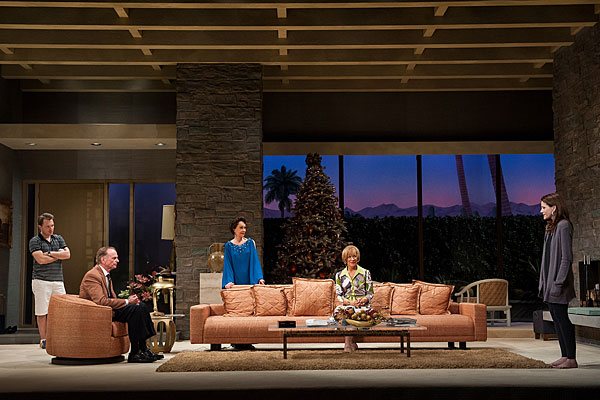
If nothing else, Jon Robin Baitz’s Other Desert Cities is a witty and fraught commentary on the peril of adopting denial as a way to survive in a family separated by generations, politics, and secrets. But this production lacks the bite of its Broadway predecessor and is marred by performances that fail to capture the energetic and intense text.
Other Desert Cities is the story of the Wyeth clan. Father Lyman (Chelcie Ross, a.k.a. Conrad Hilton on Mad Men) is a movie-star-turned-Ambassador; his wife Polly (Deanna Dunagan) was a confidant of Nancy Reagan and Betsy Bloomingdale as well as a successful screenwriter. Then there’s son Trip (John Hoogenakker), a Hollywood producer behind a Judge Judy-type show, and daughter Brooke (Tracy Michelle Arnold), an author whose second book threatens to irrevocably damage the delicately balanced family. While the four Wyeths—and Linda Kimbrough as Aunt Silda, a wacky recovering-alcoholic—start as a perfectly in sync California WASP family (playing tennis together, going to the country club for Christmas dinner), their tenuous balance is thrown into freefall by the impending publication of Brooke’s memoir. The topic of the tell-all family saga? Henry, the eldest of the Wyeth children, whose tragic life ended in an apparent suicide decades earlier, and the damage his death wrought on those left behind.
But Brooke’s version of Henry’s spiral into drugs and violence differs vastly from what her parents recall, and it’s those differences—plus the flare of publicity sure to hit the very private Wyeths—that light the fuse of the familial powderkeg in the Wyeth’s desert mansion.
If Brooke adapts her truth into art, Trip warns, she should know that her artistic integrity will cost her the trust and support of her family. Trip tries to remain neutral while being unwillingly thrust into the role of family peacemaker. Lyman argues for postponing the entire discussion while Silda, who seems supportive of Brooke’s efforts, has her own secrets involving the manuscript. Baitz’s dialogue deftly depicts the way a single event can surface the most deeply buried aspects of a family’s troubled interior.
But this production suffers from imperfect casting and weak direction. Arnold’s Brooke is nasal and strident and spends most of the production looking (and sounding) rather one-dimensionally petulant and vexed. As for Linda Kimbrough’s Aunt Silda, she’s little more than a daffy sitcom character and seems to have wandered into the drama from another play entirely. Dunagan does well channeling the icy power of a Nancy Regan-type, but it’s Hoogenakker who dominates the production despite the fact that Trip is a decidedly supporting role.
Other Desert Cities is a taut, witty exploration of a family forced to confront its demons. But at the Goodman, those demons lack potency. In the end, Other Desert Cities comes across more as a sitcom than a substantive drama.
Catey Sullivan is Chicago magazine’s contributing theater critic.
Photograph: Liz Lauren



